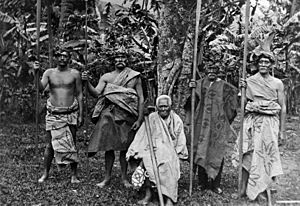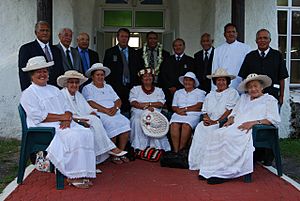Ariki facts for kids
An ariki is a special title for a high-ranking chief or noble in many Polynesian islands. This title is passed down through families, meaning it's usually inherited. You might hear different names for them depending on the island, like ꞌariki on Easter Island, aliki in Tokelau and Tuvalu, aliʻi in Samoa and Hawai‘i, ari'i in the Society Islands and Tahiti, aiki or hakaiki in the Marquesas Islands, akariki in the Gambier Islands, and ‘eiki in Tonga.
Ariki in New Zealand
In Māori society, leadership traditionally came from two main groups: the ariki and the rangatira. The ariki were considered the "persons of the highest rank and seniority." They inherited their important positions from their ancestors. Their very high status came from being the first-born children of first-born children, connecting them to important founding ancestors and even to the gods. Both men and women could be ariki in Māori culture. A famous example is Te Atairangikaahu, who was the Māori Queen and leader of the Waikato tribes.
Ariki did not always work in a simple chain of command. Even though some government officials thought they were at the top of a strict hierarchy, ariki often held many different roles at once. For example, an ariki might be the head of an iwi (large tribe), a rangatira of a hapu (sub-tribe), and a kaumatua (elder) of a whanau (family). In the past, a tohunga (expert or priest) might also be a family head, a rangatira, and an ariki.
The Māori King Movement is led by a Māori King or Queen. Their special title is Te Arikinui, which means "The big (leading) Ariki."
Ariki in the Cook Islands
Each island in the Cook Islands used to be led by several ariki, or high chiefs. For example, Rarotonga had about five or six, while most other islands had about three. Each ariki was in charge of an ivi or ngati (tribe). Below the ariki in the social order were the mataiapo and rangatira, who were minor chiefs. Just like in New Zealand, both men and women could be ariki. In 2009, a group of ariki even questioned the government's authority.
A chief's power over their people was linked to their mana. This mana was not just from their birth but also from their achievements and status. It could be gained or lost. If an ariki lost popularity with their people, their mana might be seen as decreasing. This could lead to them losing control.
Controlling tapu (sacred matters) was a strong tool for the ariki. For spiritual reasons, certain activities were forbidden. Since the ariki decided what was or was not forbidden, this gave them great power. People strongly believed in an ariki's mana and their control over all things tapu. This allowed the ariki to lead their people without needing to use physical force.
The titles of ariki, mataiapo, and rangatira are still passed down through families today. Some of the old ceremonies and traditions are still practiced in the Cook Islands.
The House of Ariki (Are Ariki) is a special body in the Cook Islands government. It was created in 1967, soon after the islands gained self-government. It is made up of the Cook Islands' high chiefs. Some experts, like Ron Crocombe and Jon Tikivanotau Jonassen, believe it was set up to give the ariki respect and dignity, but with very limited actual power.
See also
 In Spanish: Ariki para niños
In Spanish: Ariki para niños
 | Audre Lorde |
 | John Berry Meachum |
 | Ferdinand Lee Barnett |



